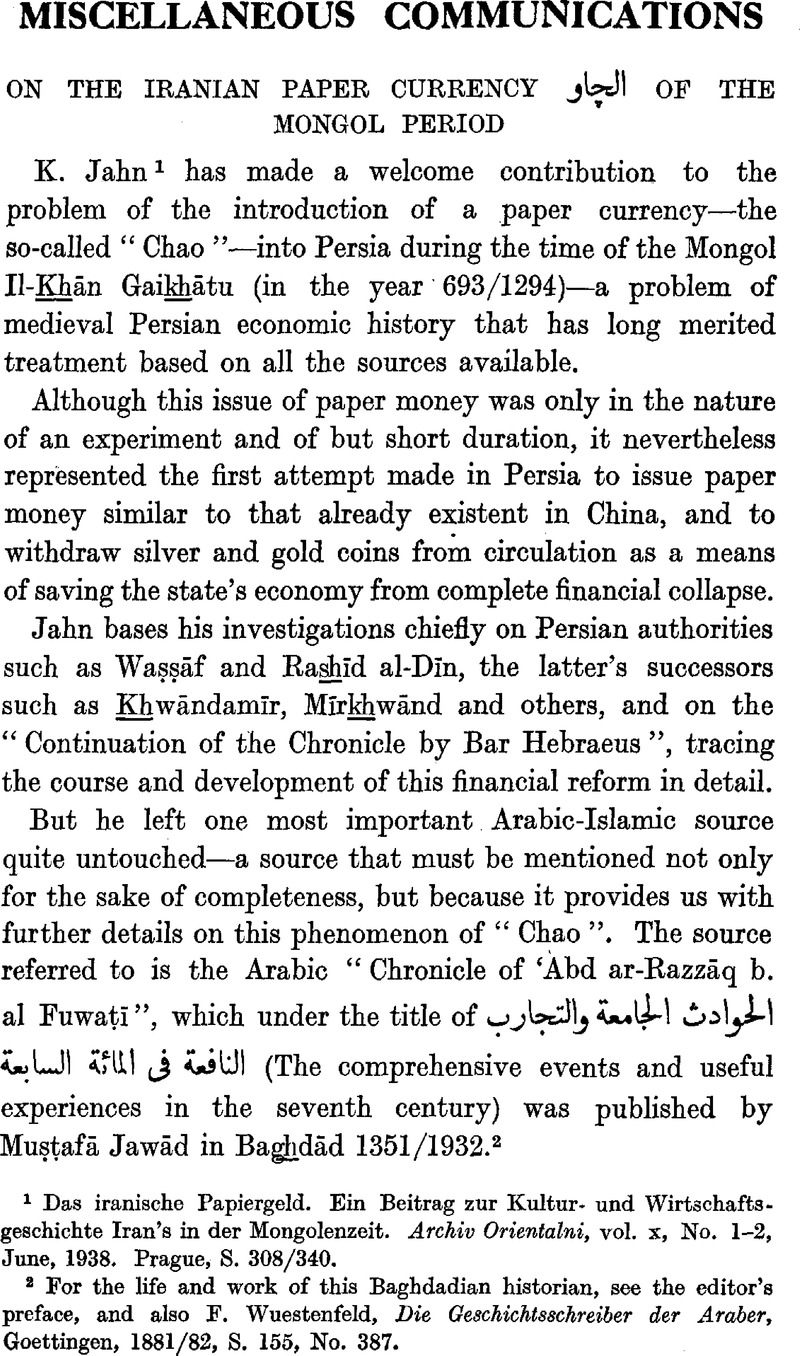Article contents
On the Iranian Paper Currency  of the Mongol Period
of the Mongol Period
Published online by Cambridge University Press: 15 March 2011
Abstract

- Type
- Miscellaneous Communications
- Information
- Copyright
- Copyright © The Royal Asiatic Society 1939
References
page 601 note 1 Das iranische Papiergeld. Ein Beitrag zur Kultur- und Wirtschaftsgeschichte Iran's in der Mongolenzeit. Archiv Orientalni, vol. x, No. 1–2, 06, 1938. PragueGoogle Scholar, S. 308/340.
page 601 note 2 For the life and work of this Baghdadian historian, see the editor's preface, and also Wuestenfeld, F., Die Geschichtsschreiber der Araber, Goettingen, 1881/1882Google Scholar, S. 155, No. 387.
page 602 note 1 Extracts from the manuscript were published in al-Mashriq (Beyrouth) in 1902Google Scholar, 1907, 1913, 1920, 1921, and 1927, and in Lughat al-'Arab (Baghdād), 1927, p. 218 et seq. See also Zayat, H. in al-Mashriq, 1937, p. 497Google Scholar, and 'Azzāwi, 'Abbās, Ta'rīkh al-'Irāq, Baghdād, 1935, vol. i, pp. 358, 359, 379Google Scholar.
page 602 note 2 Archiv Orientalni (ibid.), pp. 329–330.
page 602 note 3 Spuler, B. in hia “Quellenkritik zur Mongolengesehichte Irans”, ZDMG., 1938, vol. 92, pp. 219–243Google Scholar, where the most important Persian, Syrian, Armenian, Georgian, Mongolian, Chinese, Arabic, and other sources on Mongolian history are cited, also omits to mention the Ibn al-Fuwaṭī Chronicle.
page 602 note 4 See also my book “Jews in the economic and political life of mediaeval Islam”, Royal Asiatic Society Monographs, vol. xxii, London, 1937, p. 119Google Scholar, where I deal briefly with this issue of paper currency. I mention the Ibn al-Fuwaṭī Chronicle in another connection too. See Atti del XIX Congresso Internazionale degli Orientalisti, Rome, 1938, p. 592Google Scholar, where, however, owing to a misprint Ibn al-Fuwaṭī is spelt Ibn al-Furāt.
page 603 note 1 Thus here, notes of a quarter of a dirham are expressly mentioned; this is not done by all authorities, however.
page 603 note 2 Lekezi or Legsi; cf. Howorth, , History of the Mongols, iii, pp. 359–373Google Scholar.
page 603 note 3 This passage throws light on the hitherto unobserved effect of the “Chao” on conditions in Baghdād.
page 603 note 4 Other authorities inform us that it was Quṭb al-Dīn who was chief justice in Baghdād.
- 1
- Cited by


